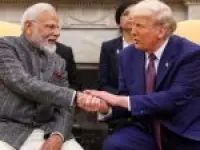
"Shocking Breach": Trump Administration Accused Of Discussing Bombing Yemen In A Group Chat
Washington, D.C. : The United States started bombing Yemen on March 15, after US President Donald Trump took to his social media account and announced that he had ordered the military “to launch decisive and powerful” actions against the Houthis. However, The editor-in-chief of The Atlantic magazine said that he was included in a private social media chat regarding upcoming attacks on the Yemeni group.
In an article titled, “The Trump Administration Accidentally Texted Me Its War Plans“, Jeffrey Goldberg, the editor-in-chief of the magazine revealed that he had been added to a group chat where high-level government officials were discussing military actions. He said he knew about the attack at least two hours before it happened because Pete Hegseth, (US Secretary of States) texted him about the war plan.
Also Read: Exclusive: Are Houthi Threats Against Israel Symbolic Or Regionally Significant?
“The world found out shortly before 2 p.m. eastern time [18:00 GMT] on March 15 that the United States was bombing Houthi targets across Yemen…I, however, knew two hours before the first bombs exploded that the attack might be coming. The reason I knew this is that Pete Hegseth, the secretary of defense, had texted me the war plan at 11:44 a.m [15:44 GMT]”, Goldberg wrote.
He said the plan also included about packages, targets, and timing. He wrote that he received a messaging request from a user named “Michael Waltz” on the encrypted messaging app Signal. At first, he doubted that this Waltz could be the real Michael Waltz, Trump’s national security adviser.
However, he soon found himself in the midst of a conversation with 18 government officials, including various National Security Council officials; Steve Witkoff, President Trump’s Middle East and Ukraine negotiator; Susie Wiles, the White House chief of staff; and someone identified only as “S M,” which I took to stand for Stephen Miller”.
Two days later—Thursday—at 4:28 p.m., I received a notice that I was to be included in a Signal chat group. It was called the “Houthi PC small group”.
“I have never seen a breach quite like this,” Goldberg wrote. At last, he notified the White House about the security breach and removed himself from the chat.
At first, he thought the group might be part of some a disinformation campaign, initiated by either a foreign intelligence service or, more likely, a media-gadfly organization, the sort of group that attempts to place journalists in embarrassing positions, and sometimes succeeds. He said he could not believe that the national-security leadership of the United States would communicate on Signal about imminent war plans. I also could not believe that the national security adviser to the president would be so reckless as to include the editor in chief of The Atlantic in such discussions”.
The editor wrote that account named as JD Vance wrote: “Team, I am out for the day doing an
economic event in Michigan. But I think we are making a mistake…3 percent of US trade runs through the suez. 40 percent of European trade does…There is a real risk that the public doesn’t understand this or why it’s necessary. The strongest reason to do this is, as POTUS said, to send a message.”
Also Read: Hamas Or Netanyahu: Who Is Responsible For The Resumption Of War?
Trump administration confirmed the breaching incident. In a statement from the National Security Council, council spokesperson Brian Hughes said, “At this time, the message thread that was reported appears to be authentic, and we are reviewing how an inadvertent number was added to the chain…The thread is a demonstration of the deep and thoughtful policy coordination between senior officials”.
Trump said eh do not know anything about it. Taking a swipe at The Atlantic, he said, “I’m not a big fan of The Atlantic. To me, it’s a magazine that’s going out of business. I think it’s not much of a magazine, but I know nothing about it”.
He then appeared to have confused the breach with with an intentional attempt to subvert the US military operation in Yemen. “It couldn’t have been very effective because the attack was very effective. I can tell you that…I don’t know anything about it. You’re telling me about it for the first time”.













